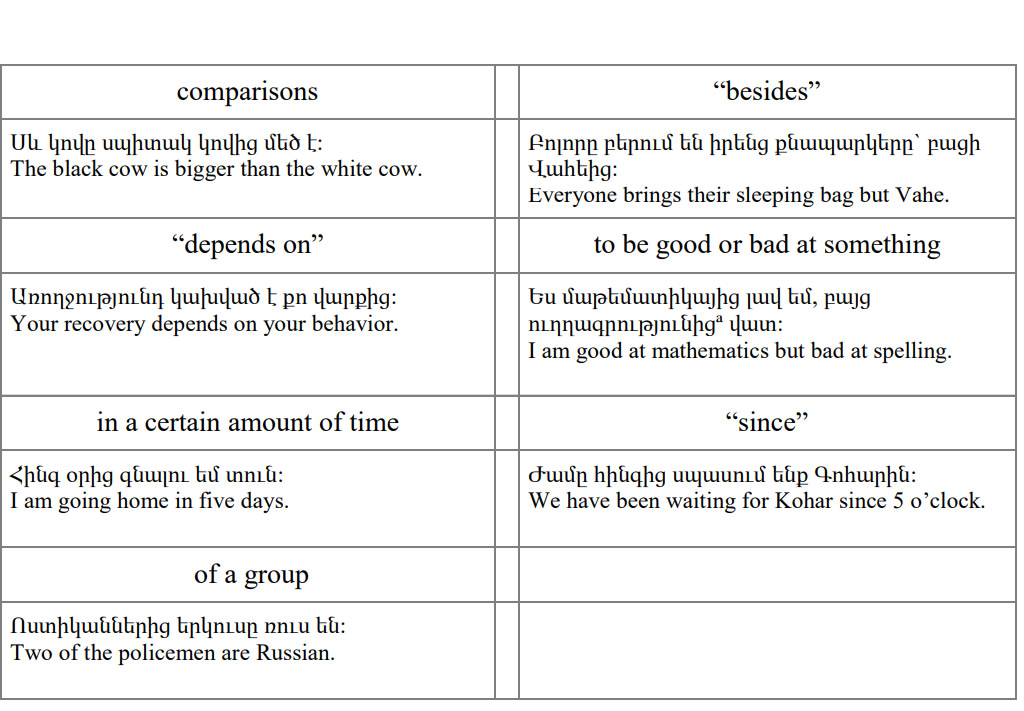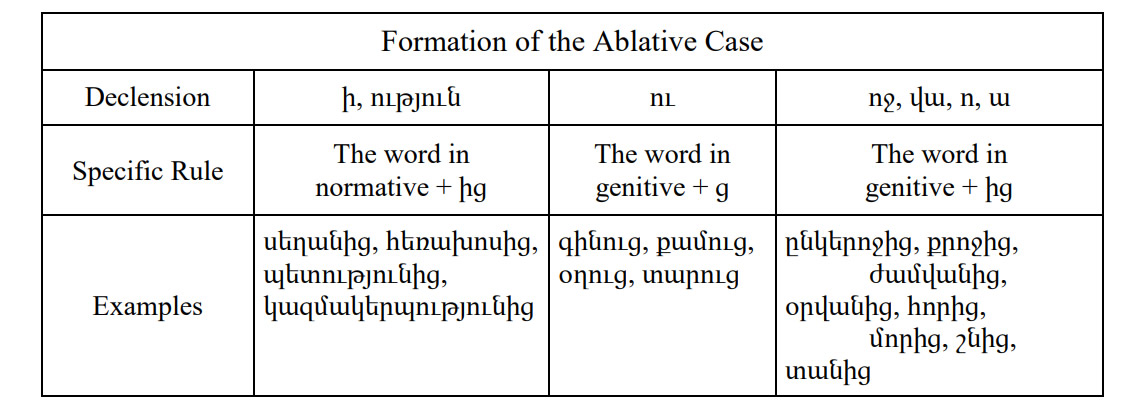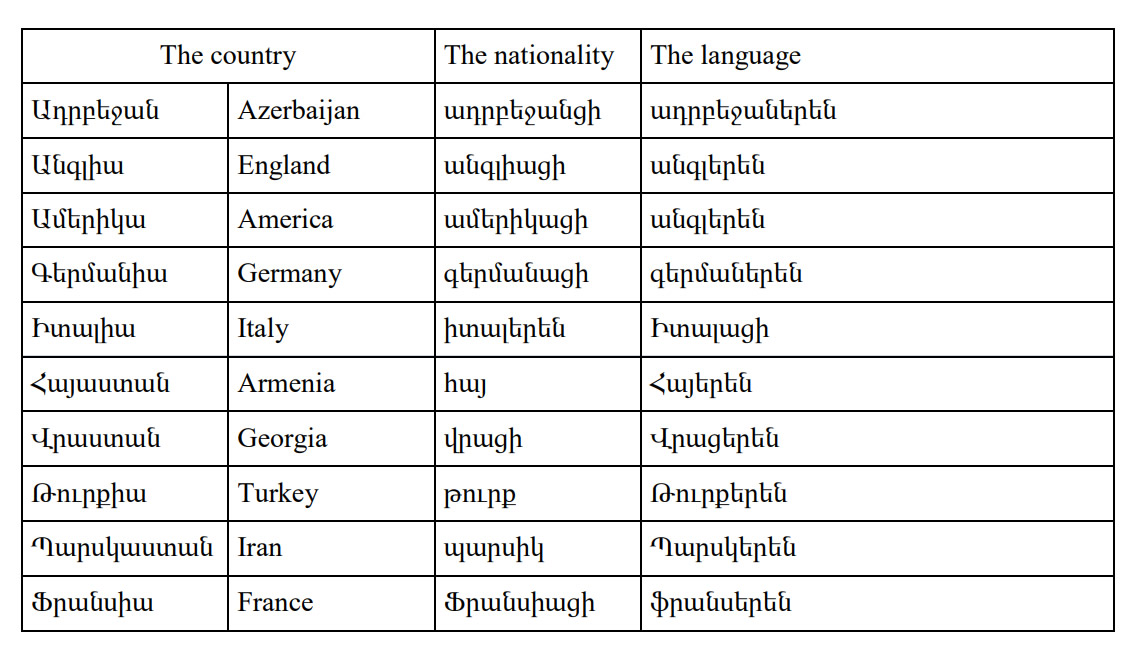Difference between revisions of "Language/Armenian/Grammar/The-Ablative-Case"
(մարդից - մարդուց) |
|||
| (11 intermediate revisions by 2 users not shown) | |||
| Line 1: | Line 1: | ||
<div class="pg_page_title">The Ablative Case in Armenian</div> | |||
[[File:Armenian-Language-Polyglotclub.png|thumb]] | [[File:Armenian-Language-Polyglotclub.png|thumb]] | ||
__TOC__ | |||
==What is the Ablative Case in Armenian?== | |||
In Armenian grammar, the ablative case is used to indicate the movement away from a location or a point in time. It is formed by adding the suffix "-ից" (-its) to the stem of the noun. | |||
For example: | |||
* մարդ (mard) - man | |||
* մարդուց (mardits) - from the man | |||
Another example: | |||
* քաղաք (k'aghak') - city | |||
* քաղաքից (k'aghak'its) - from the city | |||
Note that the ablative case is often used in conjunction with prepositions to indicate the specific nature of the movement away from a location or point in time. | |||
The ablative case is used to compose sentences that answer questions “from whom?”, “from what?” “of what?” and “from where?”. | |||
Nouns have a specific form in ablative case. The specific form a noun has in ablative depends on the type of declension it has in genitive. | |||
==Formation of the Ablative Case in Armenian== | |||
The chart below summarizes the rule for forming the ablative case. | |||
[[File:Armenian-Language- Ablative Case PolyglotClub.jpg]] | |||
Examples of sentences using the ablative: | |||
# Դու որտեղի՞ց ես գալիս։ Where are you coming from? | |||
# Ես գալիս եմ Հրազդանից։ I am coming from Hrazdan (city). | |||
# Սա ինչի՞ց ես պատրաստում։ What do you make this of? | |||
# Դա պատրաստում եմ փայտից։ I make it of wood. | |||
When a word ending with a vowel gets an ending which starts with a vowel, a consonant letter is often added. Notice that words which use the "վա" declension, get an additional ն which stands right before the ից ending, converting it to նից. So “from that day” would be “այդ օրվանից” not “այդ օրվաից.” | When a word ending with a vowel gets an ending which starts with a vowel, a consonant letter is often added. Notice that words which use the "վա" declension, get an additional ն which stands right before the ից ending, converting it to նից. So “from that day” would be “այդ օրվանից” not “այդ օրվաից.” | ||
When adding an ending which starts with a vowel, the last vowel of a word is sometimes dropped. Thus, we get շնից instead of շանից. | When adding an ending which starts with a vowel, the last vowel of a word is sometimes dropped. Thus, we get շնից instead of շանից. | ||
==Other Uses of the Ablative == | ==Other Uses of the Ablative == | ||
The ablative case has many other uses. The following chart presents a few examples: | The ablative case has many other uses. The following chart presents a few examples: | ||
[[File:Armenian-Language- Ablative Case 2 PolyglotClub.jpg]] | [[File:Armenian-Language- Ablative Case 2 PolyglotClub.jpg]] | ||
| Line 62: | Line 64: | ||
|} | |} | ||
# Ծեր մարդիկ վախենում են մահից: Old men are scared of death. | |||
# Դուք գանգատվում եք հեռախոսից։ You complain of the phone. | |||
==Countries, Nationalities, and Language: == | ==Countries, Nationalities, and Language: == | ||
Most country names in Armenian end in “-իա” or “-ստան.” The great majority of nationalities are formed by the ending “-ացի” to the country name. Most names of languages are formed by adding “-երեն” to the root stem of the country. | Most country names in Armenian end in “-իա” or “-ստան.” The great majority of nationalities are formed by the ending “-ացի” to the country name. Most names of languages are formed by adding “-երեն” to the root stem of the country. | ||
[[File:Armenian-Language- Ablative Case 3 PolyglotClub.jpg]] | [[File:Armenian-Language- Ablative Case 3 PolyglotClub.jpg]] | ||
<hr> | |||
⇒ [[Language/Armenian/Grammar/Cases-of-Nouns|Other Cases of Nouns]] | |||
==Sources== | ==Sources== | ||
https://slaviccenters.duke.edu/sites/slaviccenters.duke.edu/files/handbook_of_armenian.pdf | * https://slaviccenters.duke.edu/sites/slaviccenters.duke.edu/files/handbook_of_armenian.pdf | ||
* https://en.wikipedia.org/wiki/Ablative_case#:~:text=The%20modern%20Armenian%20ablative%20has,derives%20from%20the%20classical%20plural. | |||
* http://www.armeniapedia.org/wiki/Armenian_Language_Lessons_Chapter_2 | |||
==Other Lessons== | |||
* [[Language/Armenian/Grammar/This,-That-and-the-Other-One|This, That and the Other One]] | |||
* [[Language/Armenian/Grammar/Word-Order|Word Order]] | |||
* [[Language/Armenian/Grammar/Time|Time]] | |||
* [[Language/Armenian/Grammar/Prepositions-and-Postpositions|Prepositions and Postpositions]] | |||
* [[Language/Armenian/Grammar/Indefinite-Pronouns|Indefinite Pronouns]] | |||
* [[Language/Armenian/Grammar/Questions|Questions]] | |||
* [[Language/Armenian/Grammar/There-Is-and-There-Are|There Is and There Are]] | |||
* [[Language/Armenian/Grammar/Imperative-Mood|Imperative Mood]] | |||
* [[Language/Armenian/Grammar/Causative-Verbs|Causative Verbs]] | |||
<span links></span> | |||
Latest revision as of 06:52, 26 May 2023
What is the Ablative Case in Armenian?[edit | edit source]
In Armenian grammar, the ablative case is used to indicate the movement away from a location or a point in time. It is formed by adding the suffix "-ից" (-its) to the stem of the noun.
For example:
- մարդ (mard) - man
- մարդուց (mardits) - from the man
Another example:
- քաղաք (k'aghak') - city
- քաղաքից (k'aghak'its) - from the city
Note that the ablative case is often used in conjunction with prepositions to indicate the specific nature of the movement away from a location or point in time.
The ablative case is used to compose sentences that answer questions “from whom?”, “from what?” “of what?” and “from where?”.
Nouns have a specific form in ablative case. The specific form a noun has in ablative depends on the type of declension it has in genitive.
Formation of the Ablative Case in Armenian[edit | edit source]
The chart below summarizes the rule for forming the ablative case.
Examples of sentences using the ablative:
- Դու որտեղի՞ց ես գալիս։ Where are you coming from?
- Ես գալիս եմ Հրազդանից։ I am coming from Hrazdan (city).
- Սա ինչի՞ց ես պատրաստում։ What do you make this of?
- Դա պատրաստում եմ փայտից։ I make it of wood.
When a word ending with a vowel gets an ending which starts with a vowel, a consonant letter is often added. Notice that words which use the "վա" declension, get an additional ն which stands right before the ից ending, converting it to նից. So “from that day” would be “այդ օրվանից” not “այդ օրվաից.”
When adding an ending which starts with a vowel, the last vowel of a word is sometimes dropped. Thus, we get շնից instead of շանից.
Other Uses of the Ablative[edit | edit source]
The ablative case has many other uses. The following chart presents a few examples:

The ablative case is also used to express “of something” like in “being scared of something.” The following verbs employ “of” in this manner:
| զգուշանալ | to beware of, to take precaution against |
| ամաչել | to be embarrassed of |
| ձանձրանալ | to be sick of |
| հոգնել | to be tired of |
| գանգատվել | to complain of |
| վախենալ | to be scared of |
| ուշանալ | to be late of |
- Ծեր մարդիկ վախենում են մահից: Old men are scared of death.
- Դուք գանգատվում եք հեռախոսից։ You complain of the phone.
Countries, Nationalities, and Language:[edit | edit source]
Most country names in Armenian end in “-իա” or “-ստան.” The great majority of nationalities are formed by the ending “-ացի” to the country name. Most names of languages are formed by adding “-երեն” to the root stem of the country.
Sources[edit | edit source]
- https://slaviccenters.duke.edu/sites/slaviccenters.duke.edu/files/handbook_of_armenian.pdf
- https://en.wikipedia.org/wiki/Ablative_case#:~:text=The%20modern%20Armenian%20ablative%20has,derives%20from%20the%20classical%20plural.
- http://www.armeniapedia.org/wiki/Armenian_Language_Lessons_Chapter_2
Other Lessons[edit | edit source]
- This, That and the Other One
- Word Order
- Time
- Prepositions and Postpositions
- Indefinite Pronouns
- Questions
- There Is and There Are
- Imperative Mood
- Causative Verbs


